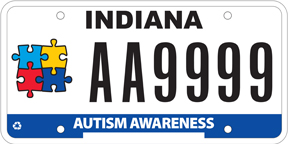Writer: Tiffany Whisner, Coles Marketing Communications
Autism continues to make headlines almost on a daily basis. According to the Centers for Disease Control and Prevention (CDC), it is estimated that one in 68 American children is identified with autism spectrum disorder (ASD). This is roughly 30 percent higher than previous estimates of one in 88 children two years ago.

Data shows ASD is almost five times more common among boys than girls. And white children are more likely to have ASD than black or Hispanic children.
Parents, healthcare professionals and educators should strive to help identify children with ASD as early as possible in order to connect them with the services they need.
Leader in early intervention
One local provider of therapy for kids with autism is Easter Seals Crossroads. Easter Seals Crossroads helps improve the lives of children and adults with special needs, disabilities or challenges by promoting inclusion, independence and dignity.
Easter Seals Crossroads has a history of meeting the needs of individuals with disabilities, which includes those with autism. The organization strives to provide help, hope and answers for families living with autism today.
Tracy Gale, Psy.D., HSPP, provides administrative direction to autism and behavioral services at Easter Seals Crossroads. She is a licensed clinical psychologist and has her doctorate degree from the University of Indianapolis.
“Easter Seals Crossroads has a variety of programs that support individuals with autism,” Dr. Gale said.
 Early diagnosis and the best possible treatment plan is the goal at the Autism Diagnostic Clinic. Through collaboration with Peyton Manning Children’s Hospital at St. Vincent, Easter Seals Crossroads provides comprehensive evaluation services to children ages 18 months to eight years with symptoms that may indicate ASD.
Early diagnosis and the best possible treatment plan is the goal at the Autism Diagnostic Clinic. Through collaboration with Peyton Manning Children’s Hospital at St. Vincent, Easter Seals Crossroads provides comprehensive evaluation services to children ages 18 months to eight years with symptoms that may indicate ASD.
“Families will leave the clinic with a diagnosis and initial treatment guidelines that will help their child meet his or her maximum potential,” Dr. Gale said. “We also partner with your primary care physician to coordinate the greatest possible care.”
Applied Behavior Analysis (ABA) and behavioral therapy is an often recommended treatment for individuals with autism. Easter Seals Crossroads offers an interdisciplinary team of clinicians and staff who partner with the child with autism, their family or caregivers and other service providers to create an effective behavior support plan.
Easter Seals Crossroads also provides early intervention programs with coordinated, structured services to help preschool children with ASD learn skills they’ll need to be successful in school.
For some children, transitioning into a mainstream school system is the goal. But at what point does preparing for life become more important?
Essential skills for living and employment
For some students with more severe deficits, the goal may not be to get them into the regular education system. The goal may be to equip those individuals with autism with daily living skills, focusing on time management, involvement in social activities with others and preparations for employment.
“Crossroads is currently working to develop a comprehensive program that assists individuals with autism as they transition from childhood to adulthood,” Dr. Gale said. “Assuring that individuals have the skills they need to be successful is a primary goal of this program.”
 Easter Seals Crossroads helps young adults with ASD develop career skills that are clear and measurable, working with school-to-work programs and preparing them to transition to the “real world.”
Easter Seals Crossroads helps young adults with ASD develop career skills that are clear and measurable, working with school-to-work programs and preparing them to transition to the “real world.”
“Individuals with autism can receive services through our Employment Division, including assistance in developing job and interview skills, help finding an internship or employment and continued support to increase employment success,” Dr. Gale said.
“In addition to employment services, we also offer a program that supports college students with autism by matching them with a peer mentor to assist with social and educational success,” Dr. Gale added.
According to the National Institute of Mental Health (NIMH), young adults with ASD are less likely to have a job or be enrolled in any type of postsecondary education when compared with typically-developing peers. Organizations like Easter Seals Crossroads work to improve transition planning and equip those individuals with autism with the skills they need.
Specialized programs for special needs
As more children are diagnosed with ASD, the demand for specialized adult services, jobs and education will continue to grow, as noted in the NIMH study.
Some recent big news comes from software company SAP. The company recruited a number of new hires this year specifically because of their autism. In the story from CBS News, it stated that 85 percent of adults with autism are jobless or underemployed.
“I think employers are sometimes hesitant to hire individuals with autism because of their own lack of knowledge about autism, specifically the wide spectrum of abilities that individuals with autism have,” Dr. Gale said.
But there are organizations, like the SAP “Autism at Work” program, that find or make employment opportunities available for individuals on the spectrum.
The SAP program is the brainchild of Thorkil Sonne, whose son has autism. Those with autism might lack social skills recruiters are looking for, but they possess many attributes high on the radar as well, including intelligence and memory.
 “Many individuals with autism are attentive to detail and routine, which may make them particularly qualified for some jobs,” Dr. Gale said. “Typically, individuals with autism respond well to structure and routine, which are often directly connected to work expectations of punctuality, responsibility and persistence.”
“Many individuals with autism are attentive to detail and routine, which may make them particularly qualified for some jobs,” Dr. Gale said. “Typically, individuals with autism respond well to structure and routine, which are often directly connected to work expectations of punctuality, responsibility and persistence.”
“There is no reason why we should leave these people unemployed when they have so much talent and there are so many vacant jobs in the high tech sector,” Sonne said in the CBS article. The SAP program wants to use the skills they see in people with autism in software testing, data analysis and quality control. So far, SAP has hired 40 workers with autism at six locations globally.
“Education is an essential part of helping improve the employment rates and experiences of individuals with ASD,” Dr. Gale said. “Providing ongoing support after an individual with autism is hired may also be necessary to ensure success in employment.”
Along with specialized programs and support, individuals with autism also have a variety of tools and technology to assist them.
The tools of technology
“Some individuals with autism use augmentative communication devices to improve their ability to communicate with others,” Dr. Gale said. “In addition, our department uses technology to teach emotion recognition and social skills.”

A CNN article by Heather Kelly said parents of kids with autism should be encouraged “to seek out dynamic apps that can help with the core challenges of autism while also being fun.” One example is Flummox and Friends, a hybrid of an app and a TV show for kids on the spectrum.
“The app reflects a larger shift in the community away from ‘fixing’ autism to accepting and embracing it. It works with the kids whose minds are wired differently, instead of correcting them,” Kelly noted in the article.
In a blog by LAPTOP, Michael A. Prospero outlines some of the best iPad apps that address various aspects of autism. Examples are:
- Proloquo2Go: An augmentative and alternative communication (AAC) app that teaches children how to construct sentences using symbols and pictures
- TouchChat HD: Uses pictograms to help individuals construct sentences. TouchChat has seven English-speaking voices, and sentences can be shared on Facebook, Twitter, text message and email.
- AutisMate: Parents can set up dynamic scenes, such as a kitchen, where a child can tap on the faucet and see a video of the proper way to wash one’s hands.
- ABA Flash Cards: Helps children recognize different emotions and nonverbal cues in others by using flash cards
- Pictello: Children can turn pictures and videos into talking story books with a picture, up to five lines of text and a recorded sound.
While technology and specialized programs are keys to enhancing the lives of those individuals with autism, they can become costly to families.
Growing crisis, greater awareness
To help with the availability of needed technology, the INDATA Project at Easter Seals Crossroads offers many kinds of assistive technology devices for loan throughout Indiana through its Equipment Lending Library. Some of these items are iPads loaded with a variety of memory and autism-focused apps, including some of the top apps mentioned above.
INDATA also provides low-interest extended rate financial loans to qualified individuals to purchase assistive technology devices through its Alternative Financing Program (AFP).
 But when it comes to customized therapy for children with autism, insurance funding issues have recently been in the spotlight.
But when it comes to customized therapy for children with autism, insurance funding issues have recently been in the spotlight.
Autism funding was highlighted in an article by J.K. Wall in the Indianapolis Business Journal. Indiana’s largest health insurer, Anthem Blue Cross and Blue Shield, has cut payments 40 percent and put stricter regulations on paying for autism therapy for children in school.
With insurance paying for fewer hours of therapy, families are forced to turn to the public school system. “And for children with more severe autism, public schools are ill-suited and ill-funded to be the major source of therapy,” as quoted in the IBJ article.
“More transition programs that provide effective support for autism are required to serve the needs of these individuals, especially as rates of diagnosis increase,” Dr. Gale said.
About Special Kids (ASK) is hosting a public health insurance training in Shelbyville, Ind., sponsored by Managed Health Services (MHS).
“Public Health Insurance: What You Don’t Know Can Cost You” is Wednesday, Sept. 24 from 10 a.m.-3 p.m. at First Christian Church, 118 W. Washington St. in Shelbyville, Ind. The cost is free, but registration is required.
This training provides parents and healthcare professionals with information about health insurance programs for families caring for children with special needs, including autism. This includes information on Medicaid, Children’s Special Healthcare Services, Hoosier Healthwise, Supplemental Security Income (SSI) and private insurance.
With new rules and regulations, the insurance and healthcare systems can be difficult to navigate, especially for services for individuals with special needs. But continuing to provide funding for autism treatment is a necessity, as autism rates have skyrocketed nationally in the past two decades.
“As society becomes more aware of autism and as individuals who were previously diagnosed with autism as children become adults, this topic is going to be at the forefront of many discussions,” Dr. Gale said. “I think strides will continue to be made over the next decade, and while some things have improved recently, there is still a long way to go.”

It’s great to see the growing awareness and support for individuals with autism spectrum disorder. This blog post highlights the importance of understanding and meeting the unique needs of individuals with autism, and I appreciate the efforts made by organizations like Easterseals in raising awareness and advocating for support. Thank you for sharing this insightful post!